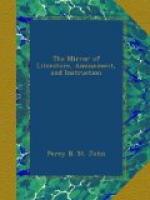Yes! in that generous cause, for ever
strong,
The patriot’s virtue and the poet’s
song,
Still as the tide of ages rolls away,
Shall charm the world, unconscious of
decay!
We cannot even contend that the sun has the effect of inflaming the imaginations of men, and infusing into them either vivacity or a poetic spirit. The French, Greeks, Egyptians, and Persians are all remarkable for gaiety; while the Spaniards, Turks, and Chinese, the latitudes of whose countries vary but little, are noted for a grave and serious deportment. The land that has given birth to Shakspeare and Milton has no reason to complain of the want of warmth of imagination. Klopstock and Goethe,—the latter now allowed to be first of the living poets,—are instances of the wide range of the spirit of poetry. Shall we, who have seen Byron writing, as it were, in the midst of us, yield assent to calling Greece and Italy the countries of imagination, par excellence, because they have produced Homer and Dante? Assuredly not. We cannot even admit, as a general proposition, that the languages of the south are always the smoothest and most melodious, and the northern ones harsh, and not adapted for music. The liquid, smooth, and effeminate language of modern Italy is totally different from the strong, energetic, and harsh Latin used by the ancient Romans. The Arabic will be immediately admitted, by any who has heard a page of it read, to be extremely uncouth and disagreeable. The Russian, on the contrary, is soft and musical. And to recur to a more familiar instance, we shall find the Welsh tongue, on examination, to be in fact very poetic, and peculiarly capable of giving force and expression—whether of grandeur, of terror, or of melody—to the idea the words are intended to convey. Let the reader who understands the Welsh pronunciation, judge whether the following distich is not an echo to, and as it were a picture of, the sense of the majestic sound of thunder:—
“Tan a dwr y’n
ymwriaw,
Yw’r taranau dreigiau
draw.”
The roaring thunder, dreadful in its ire,
Is water warring with aerial fire.
The next specimen will show the capability of the Welsh to express soft and melodious sounds:—
“Mae mil o leisian meluson,
Mai mel o hyd ym mola hon.”
The mellifluence of these lines, written on a harp, is totally lost in the translation:—
Within the concave of its womb is found
The magic scale of soul-enchanting sound.
The best illustration of the comparative degree of mental excellence between the southern and northern nations, is, perhaps, that of Bishop Berkeley, who compares the southern wits to cucumbers, which are commonly all good of their kind, but at best an insipid fruit; while the northern geniuses are like melons, of which not one in fifty is good; but when it is so, it has an excellent relish. Now it is not




